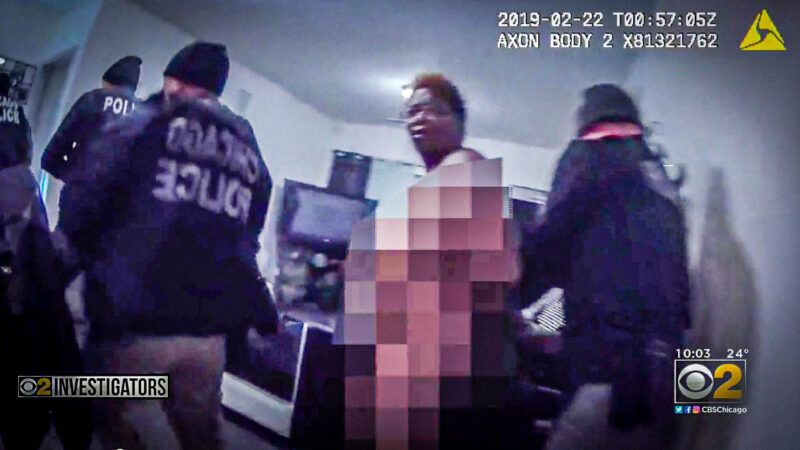Chicago Police Agree to Reforms After Wrong-Door Raid on a Naked Woman's Home Sparked Nearly 100 Misconduct Allegations
Some of the changes may make a difference. Others, not so much.

"You've got the wrong house," screamed Anjanette Young in February of 2019, shortly after a group of officers with the Chicago Police Department (CPD) used a battering ram to barge into her apartment with guns brandished. They handcuffed her while she stood there, naked, surrounded by a squadron of male cops. "You've got the wrong place!"
She would go on to remind them of that fact at least 43 times, as heard on body camera footage recorded that evening and released late last year. The officers zeroed in on her residence by way of a confidential informant, who told them a man lived at her address with an illegally possessed firearm. Otherwise known as "John Doe" warrants, they give authorities permission to seek access to someone's homes with anonymized complaints.
In this case, the suspect lived next door.
"Oh my God, this cannot be right," Young yelled through tears. "How is this legal!?"
It's a decent question: A report from Chicago's Civilian Office of Police Accountability found about 100 misconduct allegations in that one raid alone. It's also one the department has sought to address in the months after the footage widely circulated following a report from the local CBS affiliate. A new search warrant policy goes into effect May 28.
Some of the changes may be impactful; others, not so much. A female officer, for example, will be required to be on-site when warrants are executed. One wonders how that will create much systemic change. Perhaps more consequential is that several supervisors will now be required to sign off on any raids where someone might be home, and bureau chiefs will have to review applications for those John Doe warrants.
That may have saved Young a traumatic experience.
"It wasn't initially approved or some crap," one officer can be heard saying on the body camera footage as he looks at his warrant notes in his police cruiser.
"What does that mean?" another responds.
"I have no idea, because, I mean, they told him it was approved," the first cop responds. "Then I guess that person messed up on their end."
Still, some are unconvinced that CPD's tweaks are sufficient. "At least one department critic said the changes do not go far enough," reports The Chicago Tribune, "pointing to an ordinance that was drafted in February 2021 that included more demands for transparency and stronger language around prohibiting aggressive interactions, such as pointing a gun at a child, during the execution of warrants."
That's particularly relevant when considering CPD's sordid history executing similar warrants. "CBS 2's investigation found that Chicago SWAT teams were frequently relying on unverified search warrants to ransack houses; hold families, including children, at gunpoint; and in one case handcuff an 8-year-old child," wrote Reason Criminal Justice Reporter C.J. Ciaramella in December of last year. "In another case, 17 Chicago police officers burst into a family's house with their guns drawn during a four-year-old's birthday party. One Chicago family says police officers raided their house three times in four months looking for someone that the family says it doesn't even know."
In recent years, there have been 10 such lawsuits alleging that Chicago police botched warrants and wielded them against the wrong people, terrorizing them in the process. Unfortunately, Young can add her name to that list.


Show Comments (37)